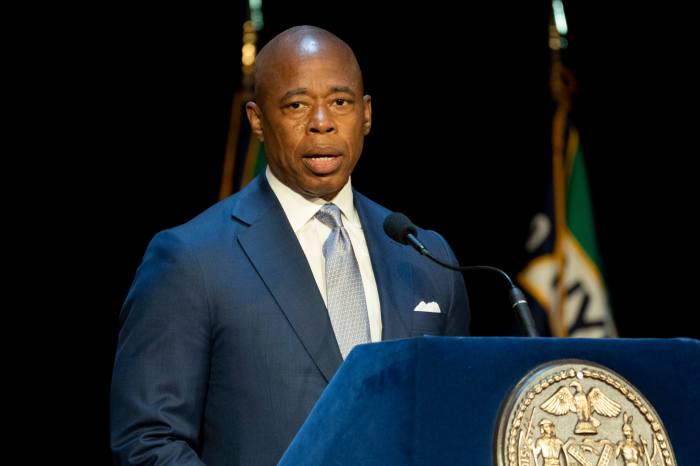WASHINGTON – With Pennsylvania in her pocket, Hillary Clinton pursued the Democratic nomination with renewed vigour Wednesday in the face of enormous challenges.
And Barack Obama was grappling with yet another missed opportunity to put her away in what has become a bitter, bruising battle for a shot at the White House.
He’ll get another chance to close the deal in two weeks in a showdown in Indiana, considered a toss-up, and North Carolina, where he’s favoured.
An upset would be a welcome relief for some Democratic officials who fear the epic marathon is irreparably splitting the party and undermining efforts to focus on beating Republican John McCain this fall.
But many analysts see the race going through until at least the end of voting June 3, Clinton has signalled she has every intention of seeing it through.
Pennsylvania did little to change the fundamentals of the race. Obama still bests her in states won and pledged delegates.
Clinton won at least 81 delegates to the party’s national convention in Tuesday’s contest, with seven still to be awarded. Obama won at least 70.
Overall, Obama was leading with 1,719.5 delegates, including party and elected officials known as superdelegates. Clinton had 1,591.5 delegates of the 2,024 required, according to The Associated Press.
No one expects Clinton to overcome his delegate lead in the nine contests left.
But her 10-point victory in Pennsylvania, after winning Ohio and Texas in March, exposed weaknesses in Obama’s campaign and bolstered her argument that he would have trouble winning over blue-collar workers and large swing states against McCain in November’s general election.
“I’ve won the states we have to win – Ohio, now Pennsylvania,” Clinton said Wednesday.
“If you look at the broad base of support that I have accumulated, it really is the foundation on which we build our victory come the fall,” she told CNN.
Clinton is hoping she can make that case convincingly to superdelegates who will decide the race, despite where she stands in the final tallies on June 3.
David Plouffe, Obama’s national campaign manager, dismissed concerns about the candidate’s electability.
Obama would easily pick up crucial big states like California and New York in the general election, Plouffe said. “Any Democratic candidate is going to carry those states.”
Plouffe pointed out Obama is leading Clinton in matchups with McCain in plenty of states and has won the blue-collar vote in some contests since voting began in January.
“We think there’s an enormous amount of data that shows we’re the stronger candidate,” he said.
Key demographic groups will switch to Obama when the time comes, he said. “We strongly believe when we do have a nominee that the vast majority of those voters are going to come home.”
Still, it was a disappointment for Obama that he failed to carry Pennsylvania despite laying out $11.2 million on advertising, outspending Clinton more than two to one.
Some say the loss can be blamed in part on his comment that small-town voters are “bitter” about the troubled economy, and a lacklustre debate performance against Clinton last week when he faced questions about controversial remarks from his former pastor.
One-quarter of voters who decided in the final week supported Clinton by a margin of nearly three to two.
Obama’s relationship with Rev. Jeremiah Wright is already providing fodder for Republicans.
On Wednesday, McCain unsuccessfully urged the Republican party in North Carolina not to air a commercial showing Wright denouncing the United States from the pulpit.
The commercial says both Democratic candidates in the race for state governor support Obama, who is “just too extreme for North Carolina.”
Obama did well in Pennsylvania among younger voters, as well as blacks, higher-income earners and people who recently switched to the Democratic party.
But he failed to cut into Clinton’s support among women, rural dwellers and older, middle-class white workers who will be critical this fall.
Obama won among people who said the Iraq war was the most important issue, but they were in the minority compared with voters who cited the economy. Clinton led there by 58 per cent versus 42 per cent.
White voters who cited race as a top factor supported Clinton by a margin of three to one. She also did much better than Obama among white Catholics, an important swing group this fall.
Some analysts suggested Obama’s harsher tone and attacks on Clinton were too jarring to those accustomed to his message of hope, and tarnished his image as a candidate above the fray.
But the New York Times, in a scathing editorial, laid most of the blame for the negative campaign on Clinton, whom the paper endorsed in January.
“Voters are getting tired of it, it is demeaning the process and it does not work,” the Times said.
“It is past time for Senator Hillary Rodham Clinton to acknowledge that the negativity, for which she is mostly responsible, does nothing but harm to her, her opponent, her party and the 2008 election.”
Obama dismissed suggestions that he plans to turn up the heat and perhaps emphasize the controversies of Bill Clinton’s White House years.
“We have not had any discussions about going negative,” he said in a radio interview.
“We have been pretty tame in terms of taking our shots and just rolling with them,” he said later in New Albany, Ind.
While Clinton’s campaign reported being on track to raise $10 million in the 24 hours since she won Pennsylvania, Obama still has significantly more resources for the contests ahead.
With more than $40 million in the bank at the end of March, he has a head start on her in North Carolina and Indiana and is already running ads in Oregon which votes May 20.
Some analysts expect the gains Clinton secured among delegates in Pennsylvania will be wiped out after the next couple of primaries, and any advantage she had will be gone.
“When is Hillary Clinton going to realize there’s no way to win?” ask led analyst Charles Cushman at George Washington University.
“If she were anyone else, the party leaders would have told her to go long ago.”
















